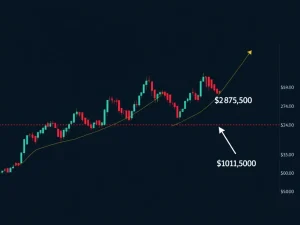Bitcoin ETF: Pioneering Central Asia’s Crypto Future with BitGo’s Secure Custody

The digital asset landscape in Central Asia just took a monumental leap forward. Kazakhstan, a nation increasingly recognized for its crypto industry presence, has officially launched the region’s first spot Bitcoin ETF. This significant development promises to open new avenues for investors seeking regulated exposure to the world’s leading cryptocurrency. For many, it marks a pivotal moment, bridging traditional finance with the burgeoning digital economy.
BitGo’s Pivotal Role in Secure Crypto Custody
BitGo, a prominent US-regulated crypto custodian, stands as the cornerstone of this groundbreaking initiative. The company will safeguard the underlying Bitcoin assets for the newly debuted Fonte Bitcoin Exchange Traded Fund (BETF). This ETF made its official launch on Wednesday on the Astana International Exchange (AIX) in Kazakhstan. Furthermore, the AIX operates within the Astana International Financial Centre (AIFC) framework, enhancing its credibility.
Fonte Capital, an AIFC-registered asset manager, diligently manages the BETF. This fund offers indirect investment access to Bitcoin (BTC) for a broad spectrum of investors. Importantly, this includes retail participants, according to AIX statements. Significantly, the BETF is physically backed by Bitcoin. These assets are held securely in the custody of BitGo Trust, a US-based subsidiary of BitGo. BitGo is already well-known for providing BTC custody to major US Bitcoin ETF issuers, such as ARK Invest and 21Shares. This involvement clearly underscores BitGo’s expanding influence in the global crypto custody sector. Source: BitGo.
A New Era for Kazakhstan Bitcoin ETF Access
BitGo’s involvement in the Fonte Capital-issued spot Bitcoin ETF marks a significant first. This is the platform’s inaugural venture providing institutional-grade Bitcoin access to investors in Central Asia. The company explicitly stated this milestone in an announcement on X. BitGo proudly declared, “Kazakhstan is entering a new era for digital assets.” Moreover, it affirmed its commitment to offering custody services through “secure, US-regulated cold storage.”
Despite BitGo publicly acknowledging its crucial role in the new spot Bitcoin ETF, neither Fonte Capital nor the Astana International Exchange mentioned the custodian in their official announcements. This discrepancy has been noted by market observers. Crypto News Insights reached out to AIX, Fonte, and BitGo for comment, but had not received a response by publication. Nevertheless, BitGo’s participation remains a key factor in the fund’s structure.
The “Double-Edged Sword” of Global BitGo Support
The increasing prominence of platforms like BitGo in spot Bitcoin products worldwide presents a complex scenario. According to Shady El Damaty, a digital identity innovator and co-founder of human.tech by Holonym, this situation is a “double-edged sword.” He elaborated to Crypto News Insights, saying, “On one hand, you’re getting institutional-grade custody right out of the gate, which matters for investor confidence. On the other hand, it highlights how concentrated this layer of infrastructure still is.”
El Damaty emphasized the growing need for local crypto products in developing markets. He suggested that relying on a single global player is not a long-term solution. However, it undeniably accelerates the market entry of products like spot Bitcoin ETFs. He stated, “BitGo’s involvement gives Kazakhstan an instant credibility boost.” He further advised, “Ideally, countries should be working toward building local custodians that meet the same security standards. That way, you’re not just importing financial infrastructure, you’re growing it at home, giving the market both sovereignty and resilience.” This perspective highlights a crucial balance between immediate gains and sustainable development.
Fostering Financial Sovereignty in Central Asia Crypto
Bakhrom Saydulloev, a local crypto insider and product lead at Mercuryo, echoed El Damaty’s sentiments. He strongly emphasized that robust local custody is crucial for the financial sovereignty of jurisdictions such as Kazakhstan. However, he also acknowledged the current reality. Saydulloev told Crypto News Insights, “But right now using a proven global custodian is the fastest route to credibility and foreign capital inflows.” This statement underscores the pragmatic approach taken by emerging markets.
The launch of the BETF, supported by BitGo, represents a significant step for the Central Asia crypto landscape. It introduces a regulated investment vehicle where none existed before. This move could inspire other nations in the region to explore similar initiatives. Ultimately, it contributes to the broader adoption and institutionalization of digital assets across Central Asia.
Market Impact and Regional Significance of the Bitcoin ETF
The Astana International Exchange (AIX), founded in 2017, holds significant backing. It is supported by the AIFC, the Shanghai Stock Exchange, the Silk Road Fund, and Nasdaq. As of July 2025, AIX handles approximately $130 million in monthly trades. While AIX volumes are modest compared with giants like Nasdaq—which saw $73 billion in European equity trades last month—the BETF launch is profoundly significant. Source: AIX.
This new fund provides regulated Bitcoin access to investors who have historically been excluded from such opportunities. Saydulloev highlighted this point, stating, “Until now, there was no regulated, locally listed product giving investors exposure to it.” He also stressed Kazakhstan’s emergence as a major player in the crypto industry, particularly in cryptocurrency mining. El Damaty added, “In regions where traditional finance has left huge gaps, tools like this can be a bridge, not just for investors, but for everyday people to start participating in the digital economy.”
The Kazakhstan Bitcoin ETF represents more than just a new financial product. It symbolizes progress in making digital assets accessible and legitimate within a regulated framework. This initiative sets a precedent for future crypto integration in emerging markets globally. It empowers local investors and attracts international capital, fostering growth and innovation in the region.
The debut of Central Asia’s first spot Bitcoin ETF, facilitated by BitGo’s secure custody, marks a watershed moment for the region’s financial evolution. It brings regulated crypto access to a previously underserved market. While discussions about centralized custody persist, the immediate benefits of enhanced credibility and accelerated market entry are undeniable. This development paves the way for a more inclusive and robust digital economy in Kazakhstan and across Central Asia.










